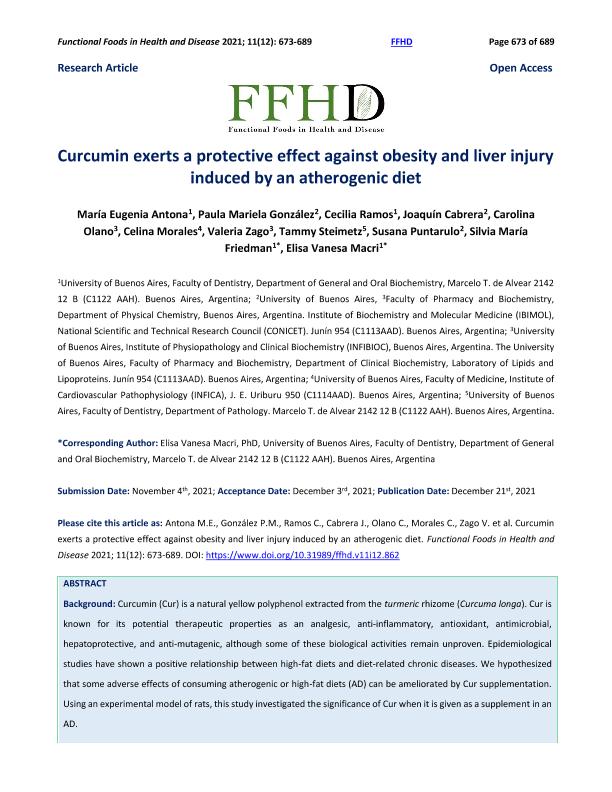Artículo
Curcumin exerts a protective effect against obesity and liver injury induced by an atherogenic diet
Antona, María Eugenia; González, Paula Mariela ; Ramos, Cecilia; Cabrera, Joaquin
; Ramos, Cecilia; Cabrera, Joaquin ; Olano, Carolina; Morales, Maria Celina; Zago, Valeria
; Olano, Carolina; Morales, Maria Celina; Zago, Valeria ; Steimetz, Tammy; Puntarulo, Susana Ángela
; Steimetz, Tammy; Puntarulo, Susana Ángela ; Friedman, Silvia María; Macri, Elisa Vanesa
; Friedman, Silvia María; Macri, Elisa Vanesa
 ; Ramos, Cecilia; Cabrera, Joaquin
; Ramos, Cecilia; Cabrera, Joaquin ; Olano, Carolina; Morales, Maria Celina; Zago, Valeria
; Olano, Carolina; Morales, Maria Celina; Zago, Valeria ; Steimetz, Tammy; Puntarulo, Susana Ángela
; Steimetz, Tammy; Puntarulo, Susana Ángela ; Friedman, Silvia María; Macri, Elisa Vanesa
; Friedman, Silvia María; Macri, Elisa Vanesa
Fecha de publicación:
12/2021
Editorial:
Functional Food Institute
Revista:
Functional Foods in Health and Disease
ISSN:
2378-7007
e-ISSN:
2160-3855
Idioma:
Inglés
Tipo de recurso:
Artículo publicado
Clasificación temática:
Resumen
Background: Curcumin (Cur) is a natural yellow polyphenol extracted from the turmeric rhizome (Curcuma longa). Cur is known for its potential therapeutic properties as an analgesic, anti-inflammatory, antioxidant, antimicrobial, hepatoprotective, and anti-mutagenic, although some of these biological activities remain unproven. Epidemiological studies have shown a positive relationship between high-fat diets and diet-related chronic diseases. We hypothesized that some adverse effects of consuming atherogenic or high-fat diets (AD) can be ameliorated by Cur supplementation. Using an experimental model of rats, this study investigated the significance of Cur when it is given as a supplement in an AD. Methods: Healthy adult Wistar rats were randomly assigned to one of three groups. Controls (C) received a standard diet and experimental rats were fed with AD or AD+Cur for 5 weeks. Cur (100 mg/kg body weight) was given orally daily, plus piperine (5 mg/kg body weight). The effect of Cur supplementation was studied on zoometrics, visceral fat content, serum lipids profile, hepatosteatosis, liver function and oxidative status. Results: Diets did not alter energy consumption. As compared to the other groups, AD+Cur group showed a lower total visceral fat content, percentage of perirenal, mesenteric, and pelvic fat, and body weight gain (P< 0.05). Serum total cholesterol (P<0.0001), non-HDL-C (P<0.0001) levels were significantly higher in AD groups as compared with C. Serum triglycerides and HDL-C levels remained similar among groups (P>0.05). AD induced a liver injury with macrovesicular steatosis and portal inflammation. AD+Cur rats presented microvesicular steatosis with no inflammation, achieving the lowest level of alanine aminotransferase (ALT; P<0.0001) and reductions of aspartate aminotransferase (AST; P<0.0001). Liver homogenates from AD+Cur showed that Cur supplementation reduced the dichlorofluorescein diacetate (DCFH-DA) oxidation rate induced by AD by 25 % and deferoxamine and superoxide dismutase inhibited DCFH-DA. Conclusion: Cur as a dietary supplement showed a protective effect against obesity and inflammation, but its cardioprotective ability remained unproved. Cur may develop as a promising therapeutic agent for liver diseases induced by oxidative stress. This study provides supporting evidence to confirm the beneficial effects of curcumin from the point of view of functional food science.
Palabras clave:
ATHEROGENIC DIET
,
CURCUMIN
,
LIVER INJURY
,
OBESITY
,
ROS
,
VISCERAL FAT
Archivos asociados
Licencia
Identificadores
Colecciones
Articulos(IBIMOL)
Articulos de INSTITUTO DE BIOQUIMICA Y MEDICINA MOLECULAR
Articulos de INSTITUTO DE BIOQUIMICA Y MEDICINA MOLECULAR
Citación
Antona, María Eugenia; González, Paula Mariela; Ramos, Cecilia; Cabrera, Joaquin; Olano, Carolina; et al.; Curcumin exerts a protective effect against obesity and liver injury induced by an atherogenic diet; Functional Food Institute; Functional Foods in Health and Disease; 11; 12; 12-2021; 673-689
Compartir
Altmétricas



